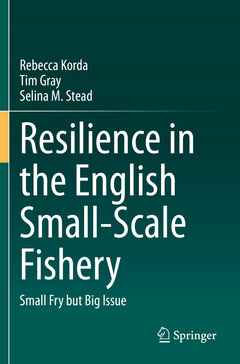Resilience in the English Small-Scale Fishery, 1st ed. 2021 Small Fry but Big Issue
Auteurs : Korda Rebecca, Gray Tim, Stead Selina M.

Dr. Tim Gray is Emeritus Professor of Political Thought employed as a Senior Research Investigator by Newcastle University in the Politics division of the School of Geography, Politics and Sociology to carry out research and doctoral supervision. He has authored/co-authored 5 books and 13 articles/chapters on political thought, and authored/co-authored/edited 9 books and 53 articles/chapters on environmental politics. The topics of the latter include temperate and tropical fisheries management, fisheries-dependent communities, stakeholder participation in fisheries governance, coral reef fisheries management, and governance of marine protected areas.
Professor Selina Stead is the Head of the Institute of Aquaculture at the University of Stirling and the UK Government’s Chief Scientific Advisor for the Marine Management Organisation. In March 2019, she moved from Newcastle University, where she served as Dean of Research and as Public Orator. A zoologist by training, Professor Stead received a joint honours BSc in Ma
Contributes to our understanding of the deteriorating situation of small-scale fisheries (SSF)
Explains why SSF are so marginalised and the growing backlash against this marginalisation
Discusses the challenges facing SSF globally and in England, and the coping strategies adopted in response to those challenges
Date de parution : 09-2021
Ouvrage de 186 p.
15.5x23.5 cm
Disponible chez l'éditeur (délai d'approvisionnement : 15 jours).
Prix indicatif 105,49 €
Ajouter au panierDate de parution : 09-2020
Ouvrage de 186 p.
15.5x23.5 cm
Disponible chez l'éditeur (délai d'approvisionnement : 15 jours).
Prix indicatif 105,49 €
Ajouter au panier

